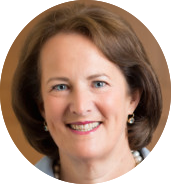

As part of our #womeninfintech series, we spoke with Karen Gordon Mills, a Senior Fellow at the Harvard Business School and a leading authority on U.S. competitiveness, entrepreneurship, and innovation. She details her perspective and experience with small businesses and lending, and highlights several other women leading the charge to create a better future with fintech.
How did you become interested in fintech?
Karen Mills: My interest in fintech grew out of my work with small businesses.
As Administrator of the U.S. Small Business Administration (SBA) from 2009 to 2013, I had a front-row seat to the challenges that small businesses face when accessing bank capital. Getting a loan is an onerous process even for the most creditworthy small business owners. It often involves carrying stacks of paperwork to a local bank and waiting months for a decision. That’s because for banks, lending to small businesses is actually pretty hard. They tend to lack complete information about the business that would allow them to determine profitability or cash flow, and since small businesses are such a heterogenous group, it’s difficult for loan officers to develop expertise in a specific sector. These frictions have led to a credit gap, especially among the smallest and most vulnerable businesses.
The traditional lending process wasn’t working for this critical part of our economy. Yet it had been this way for decades and only started to change in the late 2000s, around the time I was at the SBA. That’s when a wave of new fintechs entered the market. The fintechs gathered nontraditional data streams from their small business customers (like daily transactions) to get around the lack of information, integrated them using application programming interfaces (APIs), and deployed machine learning tools to quickly generate insights about the business and automate loan decisioning. All of a sudden, small businesses could submit applications, receive decisions, and find new funds in their accounts in a matter of days.
I thought fintech’s potential to transform small business lending was so transformational that I wrote a book describing its evolution and possible outcomes: Fintech, Small Business & the American Dream. I’ve continued to speak about and research fintech developments in my current role as a Senior Fellow at Harvard Business School.
How have you seen the industry change across your career?
Mills: Lots of people initially thought the fintechs would knock traditional banks off the map. But that hasn’t happened. Although banks might be less nimble or tech-savvy, they have established customer bases and low-cost capital—which most fintechs don’t. One big change we have seen in recent years is a rise in bank-fintech partnerships, with each seeking to benefit from the other’s strengths. Another important development is the presence of Big Tech companies, like Apple and Amazon, whose wide reach and ability to create seamless user experiences allow them to make rapid and large-scale inroads with small businesses.
The pandemic has obviously brought massive change over the last year, and accelerated the uptake of digital technologies for both lenders and borrowers. The Paycheck Protection Program (PPP) played a key role, pushing banks to overhaul their systems and get money out the door at an unprecedented pace. Fintechs were especially important in distributing aid dollars to the smallest businesses, and they may be able to leverage that success into new customer relationships. Meanwhile, with more and more activity occurring online, small businesses will likely adopt new digital tools to serve their various needs—in everything from lending to advertising.
How have you seen female leadership influence the fintech space, particularly around small businesses?
Mills: Women have developed some of the most transformative and innovative fintech solutions that I’ve seen for small businesses. For example, Kathryn Petralia co-founded Kabbage, a company that pioneered the use of alternative data and machine learning to automate small business lending. As the head of Square Capital, Jackie Reses built out Square’s similarly data- and technology-driven strategy for providing small business loans. Both of these women, and many others like them, have created crucial new opportunities for small businesses to grow and thrive.
Women’s leadership has also been influential in other, related spaces. In traditional banking, women like Jill Castilla, the CEO of Citizens Bank of Edmond, a community bank in Oklahoma, are spearheading digital transformations intended to provide better service for small businesses. In academia, female economists like Professor Sabrina Howell of NYU are doing crucial research around fintech’s impact on small businesses—including demonstrating how fintechs like Kabbage and Square played an outsize role in delivering PPP funds to minority-owned businesses during the pandemic.
What more do you think can be done to support women in fintech?
Mills: First and foremost, we need more women in fintechs, in banks, and in the research and policy areas too. There are talented women coming up in banking and in other areas of finance who will push the industry to adopt more innovative solutions.
And, yes, there are things we can do to help. Investors need to funnel more money to female founders in fintech, and established companies and organizations need to implement better recruitment and selection strategies. There are brilliant, highly-qualified women out there who may well have the next big idea or innovation for small business customers. We just need to be more deliberate about bringing them on board and promoting them to the highest leadership levels – in ways that account for the biases and obstacles that women often face.
We also need to be aware that simply recruiting more women isn’t good enough. It’s crucial to actively foster cultures of diversity, equity, and inclusion that provide women—and all underrepresented groups—with the resources and opportunities they need, and with an environment in which their contributions are valued. Organizations that do this well will be more successful in innovating and winning in a rapidly changing environment like the worlds of banking and fintech.
What advice would you give to women starting their careers in the industry now?
Mills: Fintech is a great industry to be in. Traditional banking is being challenged and organizations are more open to innovative thinking – because they have to be. Female leaders are most often excellent problem solvers. The solutions that fintechs put forward are game changing. Better access to capital can have a significant impact on the success and wellbeing of small business customers, and on the American economy.
My advice to women is that this is a critical time to get involved. Work to build a new environment that closes gaps in the market and improves access and opportunity for a more diverse set of small business owners. Get engaged, build relationships (and help each other out), pursue your ideas, and stay committed to your goals.
